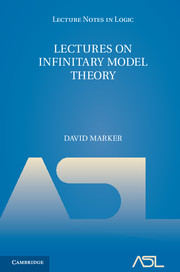INTRODUCTION
Published online by Cambridge University Press: 05 August 2016
Summary
This book grew out of two courses at the University of Illinois at Chicago. The first was team taught with John Baldwin, Meeri Kesälä and David Kueker in the fall of 2007 and the second I taught in Fall 2013. The main goal of my lectures in 2007 was to provide background material on the classical results on the model theory of infinitary languages needed to appreciate current work on abstract elementary classes that would be the focus of the other lecturers. When I returned to the material in 2013, this was still in my mind. One goal of the course was to cover the introductory material on the model theory of infinitary languages that would prepare someone interested in studying John Baldwin's Categoricity or the recent work of Zilber and his school around quasiminimal excellent classes. My second goal was to explore some of the connections between model theory and descriptive set theory, particularly effective descriptive set theory. Montálban's recent gem [59] convinced me it was timely to include this material. To make this material more accessible, I have included more-or-less self contained introductions to the needed effective descriptive set theory and hyperarithemetic theory. A dominant theme related to both goals is to study properties of counterexamples to Vaught's Conjecture.
In more detail, Part 1 focuses on foundations of the model theory of L∞, ω and Lω1,ω. In Chapter 1 we examine the expressive power of infinitary languages and prove the downward Löwenheim–Skolem Theorem. We also prove Chang's results that Lω1,ω-axiomatizable classes can be characterized as reducts of models of a first order theory omitting a set of first order types.
In Chapter 2 we give several back-and-forth criteria characterizing L∞, ω- equivalence and introduce the fundamental notion of Scott analysis and prove Scott's Isomorphism Theorem. Section 2.3 is devoted to Kueker's characterization of L∞, ω-equivalence via countable approximations and Section 2.4 gives the briefest taste of the model theory of fragments of L∞,κ for uncountable κ.
Descriptive set theory starts to play a role in Chapter 3 when we introduce a Polish topology on the space of countable τ-structures. These ideas are the key to Morley's theorem on the number of countable models.
- Type
- Chapter
- Information
- Lectures on Infinitary Model Theory , pp. 1 - 4Publisher: Cambridge University PressPrint publication year: 2016

